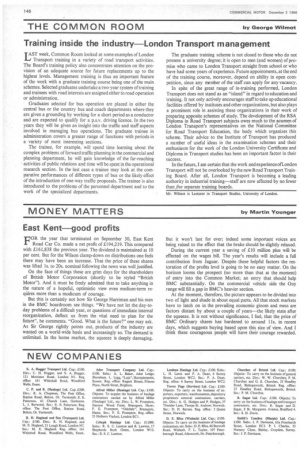Training inside the industry—London Transport management
Page 148

If you've noticed an error in this article please click here to report it so we can fix it.
T AST week, Common Room looked at some examples of London
Transport training in a variety of road transport activities. The Board's training policy also concentrates attention on the provision of an adequate source for future replacements up to the highest levels. Management training is thus an important feature of the work with a graduate training course being one of the main schemes. Selected graduates undertake a two-year system of training and trainees with road interests are assigned either to road operation or administration.
Graduates selected for bus operation are placed in either the central bus or the country bus and coach departments where they are given a grounding by working for a short period as a conductor and are expected to qualify for a p.s.v. driving licence. In the two years they will be given an insight into the traffic and staff aspects involved in managing bus operations. The graduate trainee in administration covers a greater range of functions with periods in a variety of most interesting sections.
The trainee, for example, will spend time learning about the complex problems of forward traffic planning in the commercial and planning department, he will gain knowledge of the far-reaching • activities of public relations and time will be spent in the operational research section. In the last case a trainee may look at the comparative performances of different types of bus or the likely effect of the introduction of one-way traffic proposals. The trainee is also introduced to the problems of the personnel department and to the work of the specialized departments. The graduate training scheme is not closed to those who do not possess a university degree; it is open to men (and women) of promise who came to London Transport straight from school or who have had some years of experience. Future appointments, at the end of the training course, moreover, depend on ability in open competition, since any member of the staff can apply for any vacancy.
In spite of the great range of in-training performed, London Transport does not stand as an "island" in regard to education and training. It not only actively encourages staff to take up educational facilities offered by institutes and other organizations, but also plays a prominent role in assisting these organizations in their work of preparing apposite schemes of study. The development of the RSA Diploma in Road Transport subjects owes much to the acumen of London Transport's representatives on the National Committee for Road Transport Education, the body which organizes this scheme. Their advice to the Institute of Transport has produced a number of useful ideas in the examination schemes and their enthusiasm for the work of the London University Certificate and Diploma in Transport studies has been an important factor in their success.
In the future, lain certain that the work and experience ofLondon Transport will not be overlooked by the new Road Transport Training Board. After all, London Transport is becoming a leading authority in industrial training—staff are now affected by no fewer than five separate training boards.
Mr. Wilmot is Lecturer in Transport Studies, University of London.
































































































































































































